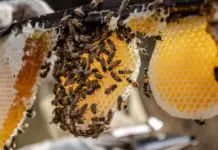Beekeeping in Colima is experiencing one of its most severe crises. In recent years, the hive population has fallen by 40%, while honey, pollen, and royal jelly production has plummeted.
Beekeeper Roberto Chávez recalled that 2022 saw the worst mortality rate, with around 1,400 poisoned hives. By 2024, the figure was around 1,100, and so far in 2025, the preliminary count is between 250 and 300.
“We haven’t made the final calculation until December, but production has dropped considerably. Even out of 10 royal jelly producers, only one remained in Armería; there is another in Tecomán, but out of 10, there are only four left in the entire state,” he explained.
He said the indiscriminate use of agrochemicals such as fipronil and neonicotinoids, as well as herbicides, is pointed out as the main cause of this situation.
Chávez explained that the Federal Government announced the ban on 35 highly harmful products, but while the measure is in effect, distributors are rushing to sell these chemicals. “Sellers are taking advantage of all this to get their products out the door before they are canceled, but they are leading us to the toilet,” he denounced.
Adding to the hive mortality is unfair competition from adulterated honey, which affects both the producers’ economy and the health of consumers. “It’s unfair competition that continues to prevail. We do everything possible to warn people not to consume pirated honey because it is harmful to them,” he stated.
Given this situation, beekeepers are migrating with their hives to areas less exposed to fumigation, but transhumant beekeeping is becoming increasingly difficult. “Today we’re in one place, the next month we’re gone, and with fewer and fewer hives. We’re moving to survive,” Chávez said.

Source: elcomentario




